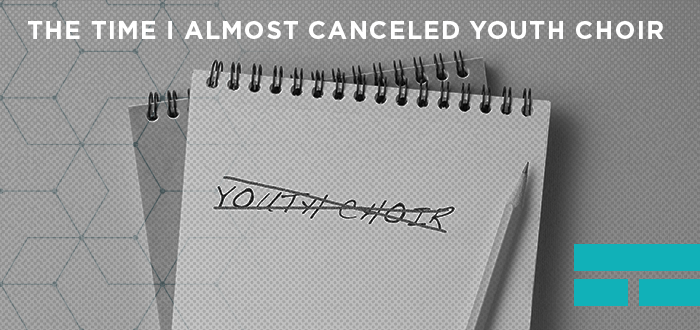As a youth pastor, I once thought about canceling youth choir. Well, more than once actually. Depending on where you grew up and your experience with church, you may have never even heard of such a thing, but I can assure you it’s real—think High School Musical, but with teenagers from your church and songs about Jesus with the occasional secular song that could be stretched into Biblical meaning.
The group would rehearse and then perform on choir tours (mission trips) and usually do some kind of local work during the day like backyard Bible clubs. It was expensive, caused competition for resources within families, and eventually was a source of competition for students’ time and attendance to other student ministry activities. Beyond all of that, I just didn’t like it. As I mentioned, I wanted to cancel it. Then, I chose to listen.
Is it really time to kill the “sacred cow”?
During this season of transition back to in-person ministry, you are hearing that now is the time to cancel that thing in your ministry you’ve wished wasn’t there. “It’s time to kill the sacred cow,” people have said. While in some cases that may be true—to cancel something without thinking deeply, having key conversations, and without casting vision, you might actually be doing more harm to the ministry (and potentially to your credibility as a leader) than what the canceled thing was doing. This would have been the case for me and youth choir.
Context matters.
As I had conversations with key parents, volunteers, and students, my pride-clouded eyes began to be opened to the ministry that was taking place. Students were being discipled, relationships with adults and each other were forming, and students whose gifts were connected to the arts were able to use their gifts in ministry for God’s glory. The students also dearly loved it.
I realized there was no way I could cancel this piece of ministry and retain credibility and support as a leader, and I realized that canceling it would be taking a piece of culture and life out of the ministry that we couldn’t afford to lose. Was youth choir my preferred avenue for the things I mentioned above? No, but in that context it was very effective in accomplishing two goals for the ministry that I was leading: relationships and discipleship. So, I jumped in with full support. I moved from opponent to proponent in my mind and actions because that was best for the ministry and that specific group of teenagers and families.
Do the relational work.
As you think about canceling something in or around your student ministry, do the extra work to make sure it’s a decision that is strategic and purposeful for the ministry, rather than something based on your own personal preference. To help you with that process, we’ve developed a worksheet that will walk you through the process of cancelling (or deciding not to) something and starting something new. I hope it is helpful for you and I wish you well as you tackle the sacred cows of your own ministry.

This post was written by Ben Trueblood, Director of Lifeway Students. Ben is passionate about investing in student ministry leaders like you. You can find more encouragement from Ben on his YouTube Channel, Student Ministry That Matters.



